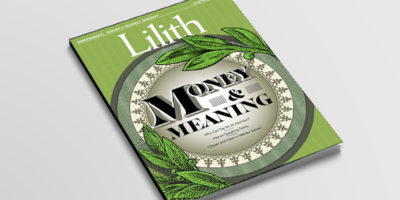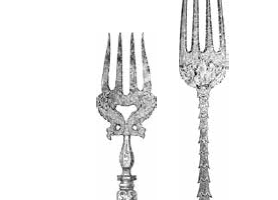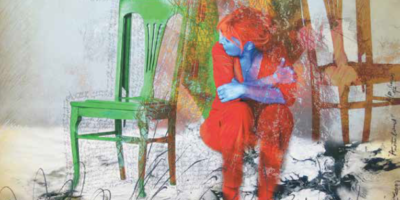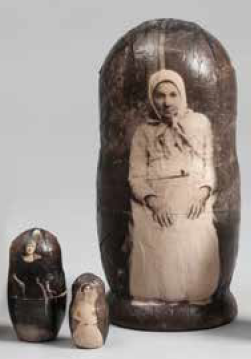
Late Revelations: When Our Matriarchs Lose Their Filters
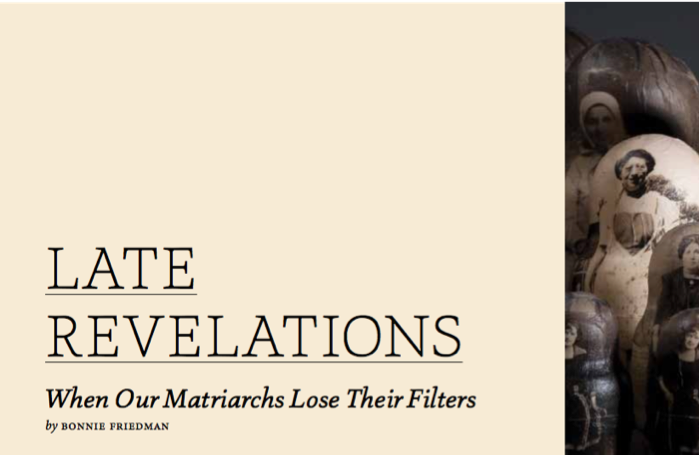 At the age of 90, my mother started speaking very differently about her mother. Her jaw tightened when she mentioned her. “All she cared about is money!” she would say. “She was competing with Rockefeller! She wanted to see how big the number in her bank account could get!” On the dinette table stood a matchbook- size photo of my grandmother’s pallid face in a babushka, her dark eyes huge and worried. She seemed, frankly, locked away, pleading to be released. The snapshot had been there, imploring, since my grandmother died 30 years ago. Now it vanished.
At the age of 90, my mother started speaking very differently about her mother. Her jaw tightened when she mentioned her. “All she cared about is money!” she would say. “She was competing with Rockefeller! She wanted to see how big the number in her bank account could get!” On the dinette table stood a matchbook- size photo of my grandmother’s pallid face in a babushka, her dark eyes huge and worried. She seemed, frankly, locked away, pleading to be released. The snapshot had been there, imploring, since my grandmother died 30 years ago. Now it vanished.
Can there be such a thing as selective dementia? My mother’s mind remained clear in all other matters. This was baffling.
Her mother, my grandmother, had been a widow who’d supported three young children by working as a seamstress in the Bronx. My mother was only two when her father died of tuberculosis. The family was poor. In my girlhood when I visited my elderly grandmother, half-finished dresses still lay piled on the table. Sometimes my grandmother was on her knees, a visitor on a chair before her, as my grandmother positioned a hem. Later, when she could no longer sew, she made 25 cents an hour stuffing records into record-jackets, alone in her apartment.
“She was a slave!” my mother often said bitterly of her mother, while I was growing up. “She worked from before dawn until midnight.”
“Well, what about Saturday?”
“Saturday she went to shul and then, in the afternoon, to Crotona Park.”
“Did she read, when she was in the park?”
“Are you kidding? She was exhausted. She didn’t read. She sat.”
This always surprised me, because I recalled my grandmother’s glass-front bookcase crammed with volumes, all in Yiddish or Hebrew. To be too tired to read! I couldn’t understand a life that didn’t have ample reading.
Mameleh my mother used to call her mother. We lived about eight blocks away. They would sit in our kitchen and drink tea. My mother once forbade me from accepting a quarter from her mother, who needed it. When I saw them, I saw their tenderness. They didn’t hug, but they often kissed on the cheek.
And so, in the beginning, and for a long time after, I dismissed my mother’s late-in-life negative view of her mother. I once asked a psychiatrist about it. “It sounds so warped to me, this brand new version of her mother. Do you think there’s anything to it?”
The psychiatrist frowned. “Well, most people don’t wait until they’re 90 to start resenting their parents,” she said, which I took to mean that if there was actually something to resent, my mother would have found it decades earlier.
So I dismissed this version as nonsensical. But as the years passed—eight, so far—my mother continued to speak of her mother in the same negative way, and I began to concede that there might be something to her version, especially as details emerged. “She didn’t care about me,” my mother told me. “I had my tonsils out when I was eleven years old, and she didn’t come.
There was another girl near me who’d also had her tonsils out. I heard her say to her parents, ‘Give my leftover ice cream to the orphan girl’. That’s how I seemed. An orphan! So they gave me the ice cream after she licked it.”
She also said, “When I was six I had bronchitis, and the hospital sent me to a Catholic hospital in Brighton Beach. I was there months. My mother came to visit only once, at Passover, and brought me a box of matzah. That was the last thing I needed! The other kids were already sticking pins in me for being a Jew! What did I need with matzahs then?”
She’d never told me these stories as a child or young adult. Only in middle-age did I get to hear them. And for many reasons I felt I was lucky to have a mother who’d lived so long.
Because my new understanding is that in advanced age, defenses thin. In old age my mother was giving me a portrait of her internal world as a very young girl. How else to understand a mother who is too busy to give attention to her toddler? She must be money-hungry! Insatiable. How else to understand a woman who doesn’t visit, but remains obsessed with her sewing machine? I am getting the version of her mother that my mother experienced when she was a child.
“I never could never find my love for her,” my mother told me one night, when I had ordered a glass of wine for her over supper. We were staying at the Marriott on my husband’s business points; my parents’ apartment had bedbugs, so we shared a bedroom for the first time in our lives. My mother didn’t drink alcohol, even at Passover. “It feels like floating!” my mother reported back, laying in the next bed over. “It’s a very nice feeling!” Then she confessed to me how she felt about her mother.
Hearing this, my own childhood finally made sense. For my mother had never enjoyed reading to me or, it seemed, paying me much attention. One of the few times she did read to me, The Cat in the Hat borrowed from the Francis Martin Library, she leapt up after six or seven pages, exclaiming, “You have no idea how it dries the throat! How much it hurts!” before she hurried out of the room to the sink.
Why did it pain her so much to read to me? I believe now I know. It sometimes hurts to give what you haven’t been given. She was as bored with me in my early childhood as her mother must have appeared to be with her. Happiness seemed a zero-sum game to us both, and if I was happy, I must be taking from her.
I felt quite mediocre, as a child. My accomplishments, when they began in my senior year of high school, came as a surprise to me, and always seemed a fluke. My intelligence, discovered so late due to a lack of early mirroring, seemed extraneous, a fun hat tied to a dull head. But now in my mother’s advanced old age, I feel that I have been given a precious lens.
Nor is it only with my own mother that I see this phenomenon of age exposing a person’s emotional core. My husband’s mother, who in fact does have dementia, often rocks in place, moaning yearningly, “Mama, Mama, Mama!” During her life of cogency she was a loquacious but emotionally aloof woman. Conversation, always filled with laughter and chatter, seemed a method to keep others at a distance. She appeared irritated by others’ needs. She was a woman with a voracious appetite, a secret eater, and her favorite thing was to be left alone to read, as my husband jokingly called them, “sagas of Hebrew passion.”
But in her mid 80s, when her mind gave way, she started saying “Mama.” Now it is almost all she says. I may be making too much of this, but I don’t think so. I think she is finally voicing the painful longing that hid behind her obdurate affect. She once told me that her mother advised her, “Nobody wants to hear about you.” Her tone at the time was impassive, her story told with a shrug. I couldn’t imagine what it felt like to hear that from one’s own mother. But now she is showing me.
How grateful I am for these late revelations. They give me pain, yes, but knowledge can be healing. If my mother had passed away before she started resenting her mother, what a loss for us both! Now, what has emerged is ambivalence, for I do believe she experienced for her mother both love and hatred. My mother suffered early deprivations that made her think that a poor woman supporting her family was in truth avaricious and cold, hoarding her assets. Consigned to the hospital ward, how lonely she must have felt, wanting the woman who apparently didn’t want her. Back home she was ignored, even neglected, while her mother bent over the sewing machine. A shard of my mother’s emotional truth flies down through the years and illuminates my own childhood. I understand now the strange absences that shaped me.
In my earliest years I recall being in a playpen, a crib, or strapped into a high chair, always at a distance from the besieged woman I craved. As an adult I was surprised to discover that “What did you learn at school today?” was considered a standard inquiry. A sense of inferiority—my own mother was uninterested in me—has haunted me, and effloresced in various kinds of mundane masochism that only midlife let me conquer.
But now, discovering my own mother’s longing has freed me to feel empathy. Here is the girl my mother was, waiting alone in her hospital bed for the woman who didn’t appear. That lonely little girl didn’t go away. She’s still there. My mother’s old age introduced me to her. I take my mother’s hand as she sits in the wheelchair. “I love when you visit,” she says. “Me too,” I answer, truthfully.
When I leave her, I am emptier and fulfilled, enlarged by the echoes of the women in my family, by my mother in the present and the past.
Bonnie Friedman is the author of the bestselling Writing Past Dark: Envy, Fear, Distraction, and Other Dilemmas in the Writer’s Life and, most recently, Surrendering Oz: A Life in Essays, which was longlisted for the PEN award in the Art of the Essay.
ART CREDIT: “A QUIET ROW OF WOMEN” BY ANDI ARNOVITZ

